Unit3 Welcome 知识点课件(共16张PPT)2023-2024学年牛津译林版八年级英语上册
文档属性
| 名称 | Unit3 Welcome 知识点课件(共16张PPT)2023-2024学年牛津译林版八年级英语上册 |
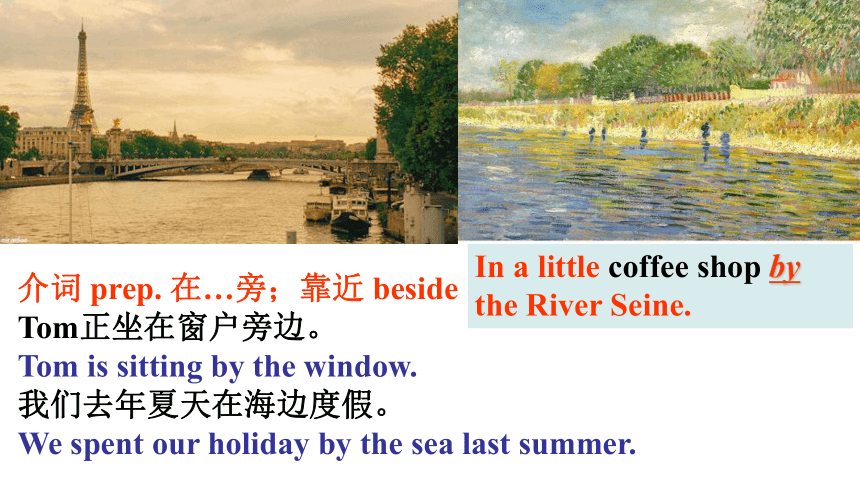
|
|
| 格式 | pptx | ||
| 文件大小 | 1.2MB | ||
| 资源类型 | 教案 | ||
| 版本资源 | 牛津译林版 | ||
| 科目 | 英语 | ||
| 更新时间 | 2023-10-06 17:38:42 | ||
图片预览

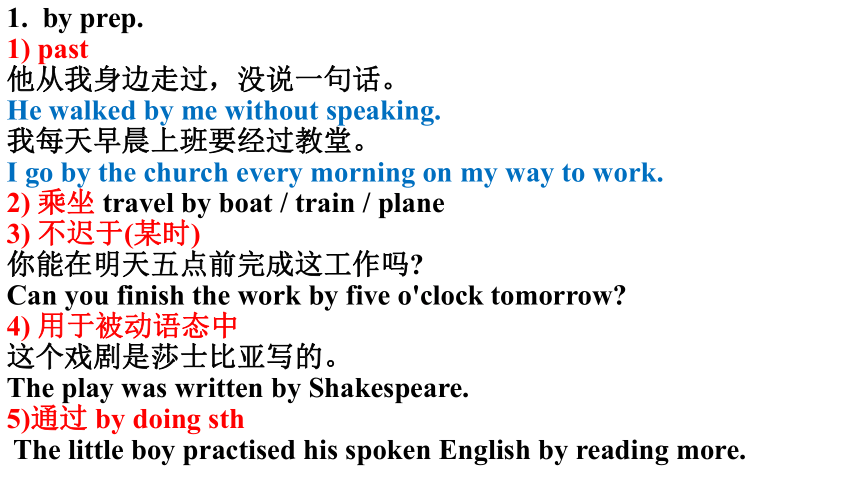
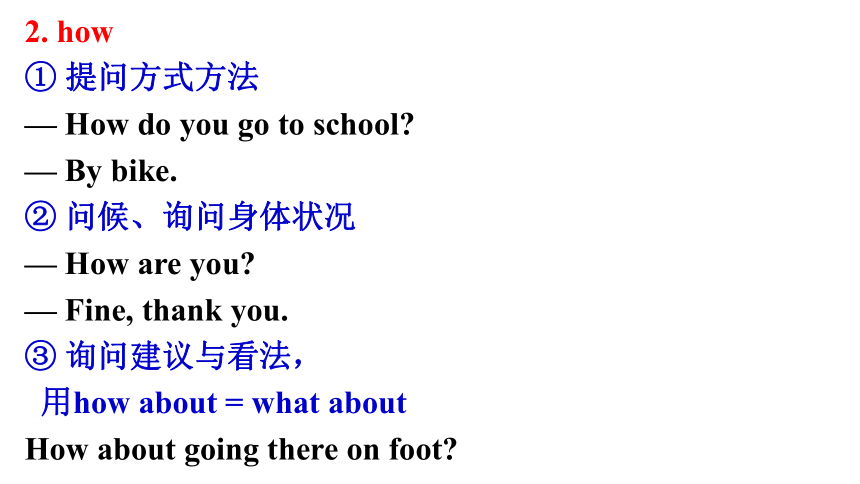

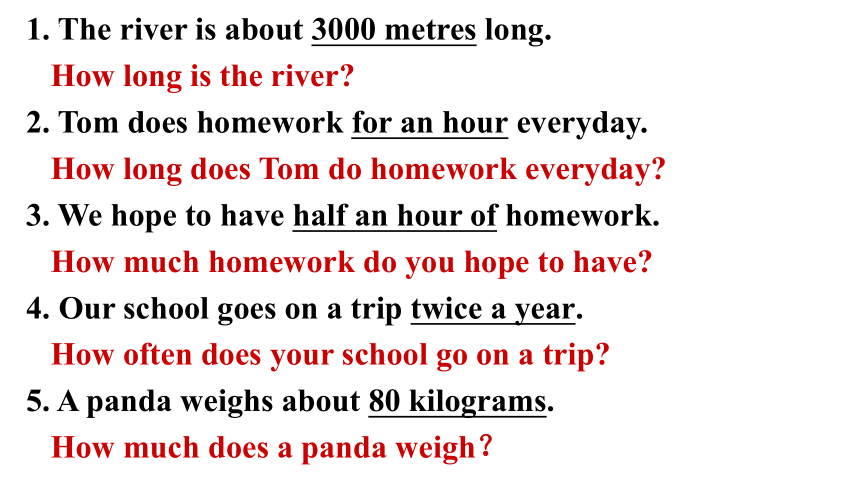
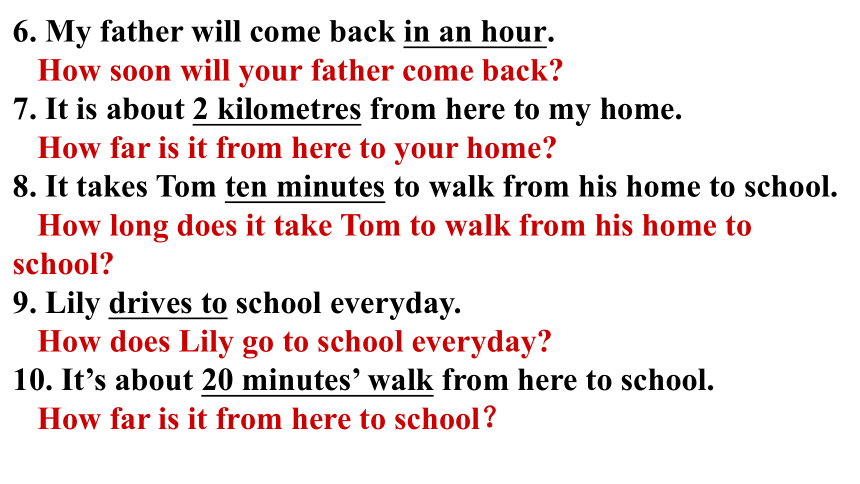
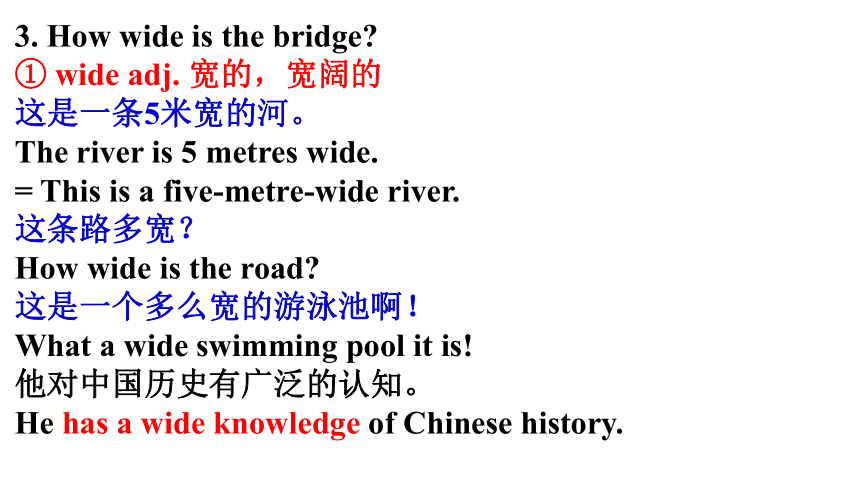
文档简介
(共16张PPT)
In a little coffee shop by the River Seine.
介词 prep. 在…旁;靠近 beside
Tom正坐在窗户旁边。
Tom is sitting by the window.
我们去年夏天在海边度假。
We spent our holiday by the sea last summer.
1. by prep.
1) past
他从我身边走过,没说一句话。
He walked by me without speaking.
我每天早晨上班要经过教堂。
I go by the church every morning on my way to work.
2) 乘坐 travel by boat / train / plane
3) 不迟于(某时)
你能在明天五点前完成这工作吗
Can you finish the work by five o'clock tomorrow
4) 用于被动语态中
这个戏剧是莎士比亚写的。
The play was written by Shakespeare.
5)通过 by doing sth
The little boy practised his spoken English by reading more.
2. how
① 提问方式方法
— How do you go to school
— By bike.
② 问候、询问身体状况
— How are you
— Fine, thank you.
③ 询问建议与看法,
用how about = what about
How about going there on foot
2. how
④How + adj.
how old 年龄
how many 数量 (可数复数)
how much 数量(不可数名词)/价格/重量等
how long 多长(时间)
how far 多远(距离路程)
how soon 多久之后(将来时,对in + 一段时间提问)
how often 多久一次(频率)
how long/how wide多宽/how high/how tall…
1. The river is about 3000 metres long.
How long is the river
2. Tom does homework for an hour everyday.
How long does Tom do homework everyday
3. We hope to have half an hour of homework.
How much homework do you hope to have
4. Our school goes on a trip twice a year.
How often does your school go on a trip
5. A panda weighs about 80 kilograms.
How much does a panda weigh?
6. My father will come back in an hour.
How soon will your father come back
7. It is about 2 kilometres from here to my home.
How far is it from here to your home
8. It takes Tom ten minutes to walk from his home to school.
How long does it take Tom to walk from his home to school
9. Lily drives to school everyday.
How does Lily go to school everyday
10. It’s about 20 minutes’ walk from here to school.
How far is it from here to school?
3. How wide is the bridge
① wide adj. 宽的,宽阔的
这是一条5米宽的河。
The river is 5 metres wide.
= This is a five-metre-wide river.
这条路多宽?
How wide is the road
这是一个多么宽的游泳池啊!
What a wide swimming pool it is!
他对中国历史有广泛的认知。
He has a wide knowledge of Chinese history.
③ widely adv. 广泛地
表达抽象性的行为和状况。
众所周知,猫喜欢鱼。
It is widely known that cats like fish.
电脑广泛运用于各种行业。
Computers are widely used in all kinds of jobs.
②wide adv. wide作副词修饰open, 意思是“充分地”。
The dentist said, “ Open your mouth wide.”
他把门大开着走了。
He left with the door open wide.
4. 90 feet wide数字短语作定语修饰名词
(1) 基数词-名词-形容词+名词
她是一个8岁的女孩。
She is an 8-year-old girl.=She is 8 years old.
(2) 基数词-名词 + 名词
我们将有一个7天的假期。
We’ll have a 7-day / 7 days’ holiday.
老师叫我们写一封800字的信。
The teacher asked us to write an 800-word letter.
Amy赢了女子400米比赛。
Amy won the women’s 400-meter race.
5. be made of 由 ……制成
The bridge is made of steel.
What is the bridge made of
It’s made of wood.
这个杯子是由纸制成的。
This cup is made of paper.
Paper is made _________ wood.
This kind of watch is made _______ Shanghai.
Wine is made _________ grapes.
from
from
in
看得出原材料
be made from
看不出原材料
be made in
地点
be made by
人
6. 反义疑问句
You are in the 8th grade, ________ you
The boy can play the piano well, ______ he
We had a day out yesterday, ________ we
A bee dances when it finds food, ________ it
Your father doesn’t like smoking, ________ he
There is little chalk in the box, _______ there
aren’t
can’t
didn’t
doesn’t
does
is
前肯定,后否定;前否定,后肯定
句型:肯定陈述句,否定疑问句?
否定陈述句(包含否定词),肯定疑问句?
注意:回答需根据事实回答,符合事实用yes,不符合用no。
You went to school by bike, ______________
_________, my bike was broken yesterday.
You need something to eat, ______________
_________, I’m hungry now.
You won’t come back soon, ______________
_________, I will come back next year.
didn’t you
No
Yes
don’t you
will you
No
回答要根据实际情况,符合用yes;不符合用no.
Tom is never late for school, ______________
_________, it makes his teacher very angry.
Tom didn’t eat lunch, ______________
_________, he had lunch with me.
He often tells lies, ______________
_________, he is an honest boy .
There is nothing in the fridge, ___________
_________, I want to buy some tomorrow.
Tom can hardly hear you, ___________
_________, I will speak loudly next time.
doesn’t he
is there
No
did he
Yes
Yes
is he
can he
No
No
反义疑问句的要点:
1.附加问句中不用名词,用代词;不用完整形式,用缩略形式。
2.前肯后否,前否后肯。
3.*陈述句中若含有no\ nothing\ nobody\ little\ few\ never\ hardly\ seldom,视为否定,附加疑问句用肯定形式。
而陈述句中含有加前缀un-/dis-或后缀-less等词,不视为否定,附加疑问句用否定形式。
7. enjoy oneself 玩得高兴,过得愉快
= have a good/great/wonderful/lovely time +doing sth.
= have fun
反身代词:myself, yourself, herself, himself, itself, themselves, ourselves, yourselves
【注意】enjoy后的反身代词要与主语形式保持一致
We enjoyed ourselves at the Flower Expo.
Peter enjoyed ________ (he) at his birthday party last night.
I guess Peter and his sister Sally enjoyed ______ at the dancing party.
A. myself B. himself C. herself D. themselves
He enjoyed himself at the party. 同义句转换
He _____ _____ _____ _____ at the party.
himself
D
had a good time
8.real 和 true 的区别:
real:客观存在,并非想象和虚构,与无相对。
eg. Lu Xun's real name is Zhou Shuren.
true:真正的,真实的,强调事实和实际情况相符,与假相对而言;
eg. The news is true.
In a little coffee shop by the River Seine.
介词 prep. 在…旁;靠近 beside
Tom正坐在窗户旁边。
Tom is sitting by the window.
我们去年夏天在海边度假。
We spent our holiday by the sea last summer.
1. by prep.
1) past
他从我身边走过,没说一句话。
He walked by me without speaking.
我每天早晨上班要经过教堂。
I go by the church every morning on my way to work.
2) 乘坐 travel by boat / train / plane
3) 不迟于(某时)
你能在明天五点前完成这工作吗
Can you finish the work by five o'clock tomorrow
4) 用于被动语态中
这个戏剧是莎士比亚写的。
The play was written by Shakespeare.
5)通过 by doing sth
The little boy practised his spoken English by reading more.
2. how
① 提问方式方法
— How do you go to school
— By bike.
② 问候、询问身体状况
— How are you
— Fine, thank you.
③ 询问建议与看法,
用how about = what about
How about going there on foot
2. how
④How + adj.
how old 年龄
how many 数量 (可数复数)
how much 数量(不可数名词)/价格/重量等
how long 多长(时间)
how far 多远(距离路程)
how soon 多久之后(将来时,对in + 一段时间提问)
how often 多久一次(频率)
how long/how wide多宽/how high/how tall…
1. The river is about 3000 metres long.
How long is the river
2. Tom does homework for an hour everyday.
How long does Tom do homework everyday
3. We hope to have half an hour of homework.
How much homework do you hope to have
4. Our school goes on a trip twice a year.
How often does your school go on a trip
5. A panda weighs about 80 kilograms.
How much does a panda weigh?
6. My father will come back in an hour.
How soon will your father come back
7. It is about 2 kilometres from here to my home.
How far is it from here to your home
8. It takes Tom ten minutes to walk from his home to school.
How long does it take Tom to walk from his home to school
9. Lily drives to school everyday.
How does Lily go to school everyday
10. It’s about 20 minutes’ walk from here to school.
How far is it from here to school?
3. How wide is the bridge
① wide adj. 宽的,宽阔的
这是一条5米宽的河。
The river is 5 metres wide.
= This is a five-metre-wide river.
这条路多宽?
How wide is the road
这是一个多么宽的游泳池啊!
What a wide swimming pool it is!
他对中国历史有广泛的认知。
He has a wide knowledge of Chinese history.
③ widely adv. 广泛地
表达抽象性的行为和状况。
众所周知,猫喜欢鱼。
It is widely known that cats like fish.
电脑广泛运用于各种行业。
Computers are widely used in all kinds of jobs.
②wide adv. wide作副词修饰open, 意思是“充分地”。
The dentist said, “ Open your mouth wide.”
他把门大开着走了。
He left with the door open wide.
4. 90 feet wide数字短语作定语修饰名词
(1) 基数词-名词-形容词+名词
她是一个8岁的女孩。
She is an 8-year-old girl.=She is 8 years old.
(2) 基数词-名词 + 名词
我们将有一个7天的假期。
We’ll have a 7-day / 7 days’ holiday.
老师叫我们写一封800字的信。
The teacher asked us to write an 800-word letter.
Amy赢了女子400米比赛。
Amy won the women’s 400-meter race.
5. be made of 由 ……制成
The bridge is made of steel.
What is the bridge made of
It’s made of wood.
这个杯子是由纸制成的。
This cup is made of paper.
Paper is made _________ wood.
This kind of watch is made _______ Shanghai.
Wine is made _________ grapes.
from
from
in
看得出原材料
be made from
看不出原材料
be made in
地点
be made by
人
6. 反义疑问句
You are in the 8th grade, ________ you
The boy can play the piano well, ______ he
We had a day out yesterday, ________ we
A bee dances when it finds food, ________ it
Your father doesn’t like smoking, ________ he
There is little chalk in the box, _______ there
aren’t
can’t
didn’t
doesn’t
does
is
前肯定,后否定;前否定,后肯定
句型:肯定陈述句,否定疑问句?
否定陈述句(包含否定词),肯定疑问句?
注意:回答需根据事实回答,符合事实用yes,不符合用no。
You went to school by bike, ______________
_________, my bike was broken yesterday.
You need something to eat, ______________
_________, I’m hungry now.
You won’t come back soon, ______________
_________, I will come back next year.
didn’t you
No
Yes
don’t you
will you
No
回答要根据实际情况,符合用yes;不符合用no.
Tom is never late for school, ______________
_________, it makes his teacher very angry.
Tom didn’t eat lunch, ______________
_________, he had lunch with me.
He often tells lies, ______________
_________, he is an honest boy .
There is nothing in the fridge, ___________
_________, I want to buy some tomorrow.
Tom can hardly hear you, ___________
_________, I will speak loudly next time.
doesn’t he
is there
No
did he
Yes
Yes
is he
can he
No
No
反义疑问句的要点:
1.附加问句中不用名词,用代词;不用完整形式,用缩略形式。
2.前肯后否,前否后肯。
3.*陈述句中若含有no\ nothing\ nobody\ little\ few\ never\ hardly\ seldom,视为否定,附加疑问句用肯定形式。
而陈述句中含有加前缀un-/dis-或后缀-less等词,不视为否定,附加疑问句用否定形式。
7. enjoy oneself 玩得高兴,过得愉快
= have a good/great/wonderful/lovely time +doing sth.
= have fun
反身代词:myself, yourself, herself, himself, itself, themselves, ourselves, yourselves
【注意】enjoy后的反身代词要与主语形式保持一致
We enjoyed ourselves at the Flower Expo.
Peter enjoyed ________ (he) at his birthday party last night.
I guess Peter and his sister Sally enjoyed ______ at the dancing party.
A. myself B. himself C. herself D. themselves
He enjoyed himself at the party. 同义句转换
He _____ _____ _____ _____ at the party.
himself
D
had a good time
8.real 和 true 的区别:
real:客观存在,并非想象和虚构,与无相对。
eg. Lu Xun's real name is Zhou Shuren.
true:真正的,真实的,强调事实和实际情况相符,与假相对而言;
eg. The news is true.
